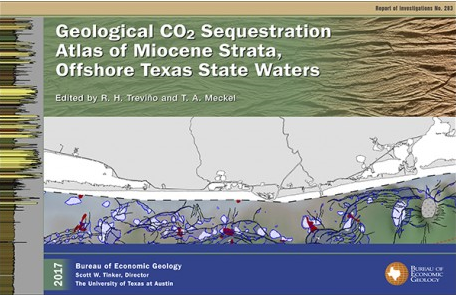Global Offshore Initiative

Program Overview
GCCC is pursuing various aspects of offshore carbon sequestration, including a global needs assessment and identifying synergies between an international community of parties interested in offshore storage.
Explore the links below for presentations, posters, and publications.
SAVE THE DATE: The Eighth International Offshore Geologic CO2 Storage Workshop will be held Monday, April 20 & Tuesday, April 21, 2026, with a field trip to the Northern Lights Project on Wednesday, April 22, 2026 in Bergen, Norway.
Plan to join us, as this highly anticipated event is:
- Organized by the Gulf Coast Carbon Center & IEAGHG
- Hosted by Equinor
- Note: The workshop will be a hybrid meeting with in-person and online options
- Registration opens January 2026. Click here to register.
- Presentations are by invitation, but if you would like to present, please contact Tip Meckel (tip.meckel@beg.utexas.edu) and Nicola Clarke (nicola.clarke@ieaghg.org)
Seventh International Offshore Geologic CO2 Storage Workshop
September 17–18, 2024
Download the IEAGHG official 2024 meeting report about the workshop here.
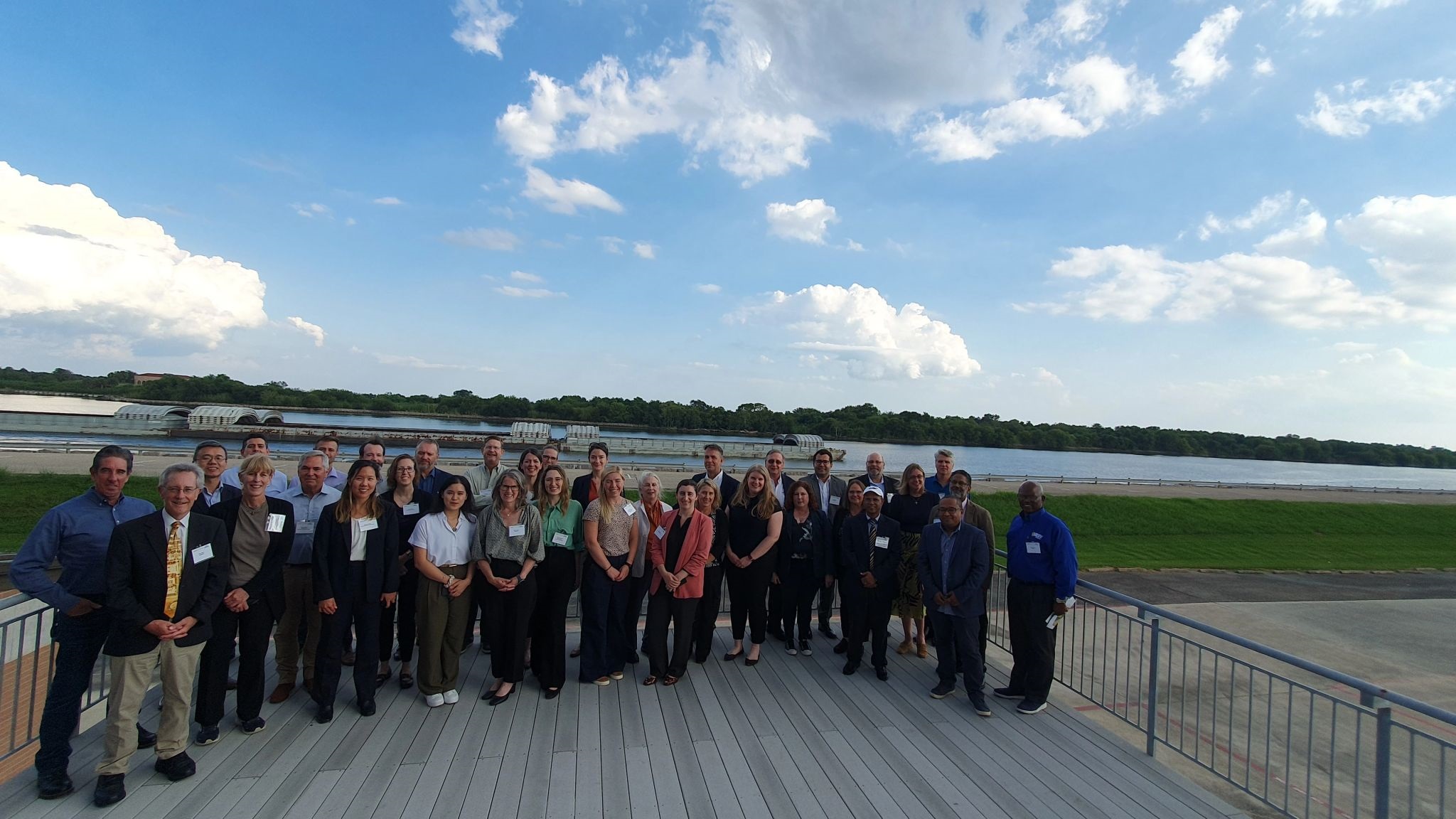
AGENDA | Download All Presentations Here
Day 1 – Tuesday 17 September 2024
SESSION 1: Welcome & Scene Setting
1.1 Welcome | Tim Dixon (IEAGHG), Katherine Romanak & Tip Meckel (UT Austin-GCCC)
1.2 Welcome from Hosts | Joe Tant, Port Arthur Chamber of Commerce
SESSION 2: International Project Roundup
2.1 Gulf of Mexico | Tip Meckel, UT Austin-GCCC
2.2 CarbonNet Pelican Project, Australia | Scott Bailey, Vic Fitzgerald, Govt of Victoria
2.3 Deep C Store, Australia | Daein Cha, deepC Store Ltd
2.4 Taiwan | Cheryl Yang, ITRI
2.5 South Korea | Eunsoo Jung, KCCUS
2.6 Petrobras' CCUS projects in the offshore scenario, Brazil | Andrea Pontual de Oliveira Weydmann, Petrobras
2.7 Malaysia | Haylay Tsegab Gebretsadik, Universiti Teknologi PETRONAS, Malaysia
2.8 Woodside, Australia | John Fox, Woodside
2.9 Bayu-Undan, Timor Leste | Tim Dixon, IEAGHG
2.10 Sleipner, Snøhvit, Smeaheia, Northern Lights & Kalundborg, Norway and Denmark | Michael Schoemann, Equinor
2.11 PilotSTRATEGY- Update on the design of the offshore CO2 injection site in Portugal Pedro | Miguel Pereira, Universidade de Évora
2.12 Porthos, The Netherlands | Willem-Jan Plug, EBN
2.13 Aramis, The Netherlands | Anneke Kleinpenning, Shell
2.14 Greensands, Denmark | Søren Reinhold Poulsen, INEOS Energy Denmark
2.15 UK Poseidon and Orion transport and storage projects | Nick Terrell, Carbon Catalyst
2.16 Prinos and The Mediterranean | Nikolas Rigas, EnEarth
2.17 NETL Offshore CO2 Storage Inventory | Julia Mulhern, NETL
2.18 Project Round Up – Global Progress | Nikki Clarke, IEAGHG
SESSION 3: Challenges and Solutions to Injecting CO2 into Depleted Fields in the Offshore
3.1 Challenges of CO2 injection into depleted reservoirs | Amanda Ardill & Owain Tucker, Shell
3.2 Poseidon Project - Preparations for UK's first well injection test | Nick Terrell, Carbon Catalyst
SESSION 4: Shipping & Direct Injection
4.1 Shore to shore & underwater CO2 Transport | Dhruv Boruah, Oceanways
4.2 Project Greensands, Denmark | Søren Reinhold Poulsen, INEOS Energy Denmark
4.3 Shipping and offshore direct injection of CO2 in geological storage | Haije Stigter, Carbon Collectors
Day 2 – Wednesday 18 September 2024
SESSION 5: Public Engagement
5.1 Gulf of Mexico: Local stakeholders' perspective | Sue Hovorka, TXLA CMC
5.2 IRA Prevailing Wage and Apprenticeship Requirements | Melvin White, MRSW
5.3 Social science research application in UK offshore energy transition projects’ – baseline survey results | Darrick Evensen, University of Edinburgh
5.4 Social science research application in UK offshore energy transition projects’ - MOET | Elizabeth Gabe-Thomas, PML & Hazel Napier, BGS
SESSION 6: Managing Risk of Potential Leakage Pathways & Products (CO2, brine, other) in the Offshore
6.1 Environmental monitoring and risk perspective - Global scene setting | Katherine Romanak, UT Austin-GCCC
6.2 Well remediation or 'do nothing' - a risk perspective | George Ormerod, Risktec
6.3 Quantitative assessment of potential CO2 leakage volumes in the Dutch North Sea Al Moghadam | Filip Neele, TNO
6.4 Update on recent HR3D survey and activity in the GOM | Tip Meckel, UT Austin-GCCC
SESSION 7: Interactive Session
7.1 Interactive session | Sue Hovorka, UT Austin-GCCC & Amanda Ardill, Shell
SESSION 8: Regulatory factors to consider
8.1 Overview | Tim Dixon, IEAGHG
8.2 Update from BOEM Melissa Batum, BOEM
8.3 Development of Australia’s National Action List for offshore CCS | Andrew Ross, CSIRO
8.4 Update from the working group on CO2 standards, ICM Forum, European Commission | Filip Neele, TNO
8.5 CO2 streams | Adriaan Kodde, Shell
Sixth International Offshore Geologic CO2 Storage Workshop
September 13–14, 2023
Download the IEAGHG official 2023 meeting report about the workshop here.
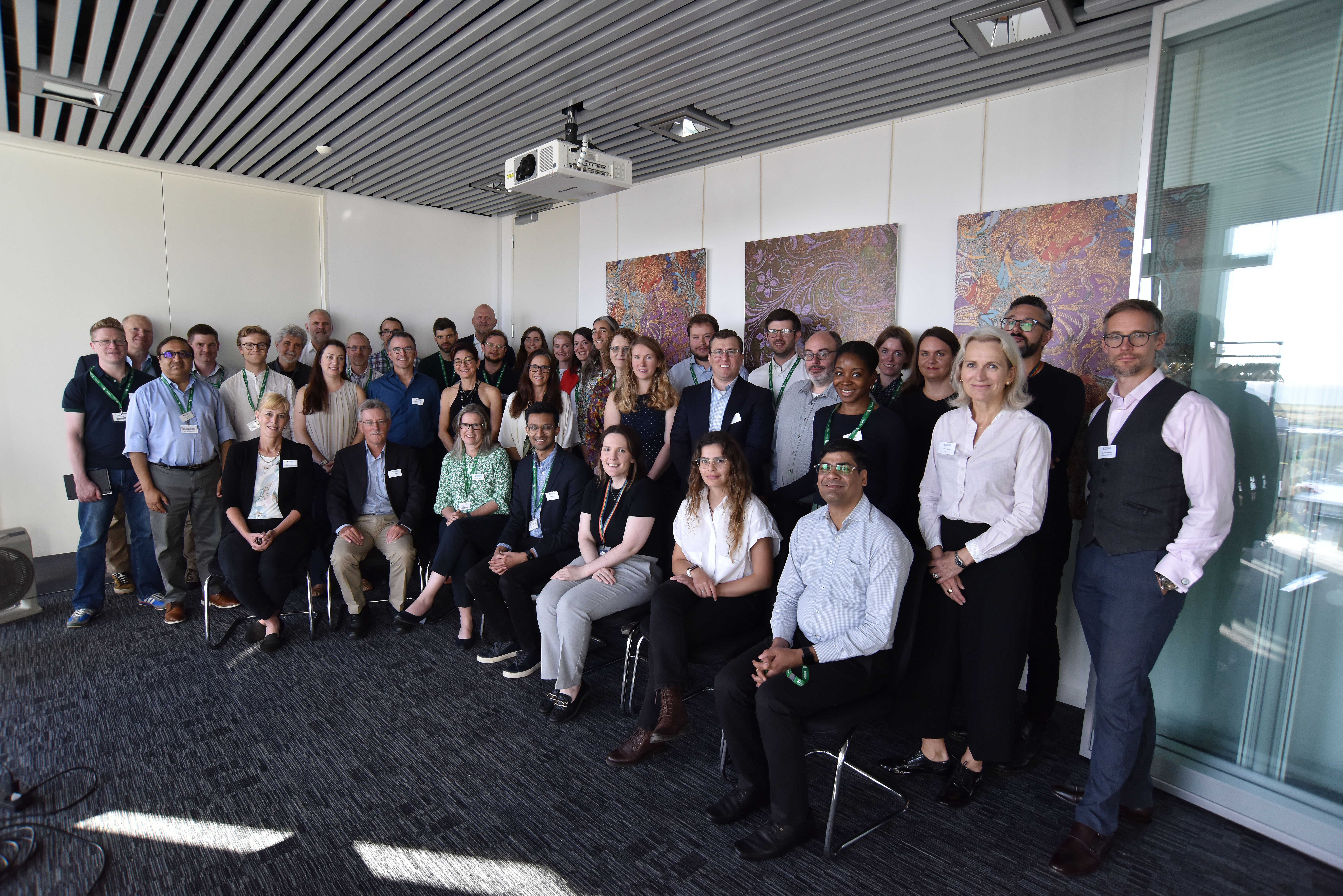
AGENDA | Download All Presentations Here
Day 1 – Wednesday 13 September 2023
SESSION 1: Welcome & Scene Setting
1.1 Welcome | Nick Forsyth, University of Aberdeen
1.2 Welcome from IEAGHG and UT Austin | Tim Dixon, IEAGHG & Katherine Romanak, University of Texas
1.3 What is different about Offshore | Owain Tucker, Shell
SESSION 2: Project Round-Up
2.1 Acorn, UK | Iain Morrison, Storegga
2.2 Prinos, Greece | Katerina Sardi, Energean
2.3 Corpus Christi, USA | Tip Meckel, presented by Katherine Romanak, University of Texas
2.4 Viking CCS, UK | Andrew Hood – Harbour Energy
2.5 Pilot Strategy, Portugal | Maria Helena Caeiro, University of Évora
2.6 Northern Lights, Norway | Catalina Acuna, Northern Lights
2.7 South Korea | Axel Lemus, CCUS
2.8 Porthos, Netherlands | Kike Beintema, EBN
2.9 Liverpool Bay, UK CCUS project | Manotti Matteo – ENI
2.10 Deep C Store, Australia | Daein Cha – Deep C Store
2.11 Taiwan | Cheryl Yang, ITRI
2.12 Poseidon & Orion, UK | Nick Terrell, Carbon Catalyst
2.13 Gulf of Mexico, USA | Rahul Umrani, Talos Energy
2.14 Pre-Salt play, Brazil | Ana Paula Musse, Petrobras
2.15 Pelican Project, Australia | Jane Burton, Victoria State Government
2.16 Enping, China | Liwei Zhang, Chinese Academy of Science
2.17 Timor Leste | Francelino Antonio Xavier-Conceicao, ANPM
2.18 Other Offshore Projects
SESSION 3: Injection & Wells
3.1 Managing our well stock | Owain Tucker, Shell & Nicola Clarke, IEAGHG
3.2 Capacity/pressure space – Gulf of Mexico | Alex Bump, University of Texas
3.3 Interactive session, Key aspects to planning a CO2 storage site | Alex Bump
SESSION 4: Legal, Regulatory & Accounting
4.1 Delivering Carbon Storage on the UK Continental Shelf – The NSTA’s role in regulating and stewarding activity at pace and scale | Matthew Farris, North Sea Transition Authority
4.2 ISO Update: WG3-27914 | Simon O’Brien, Shell
4.3 Transport of CO2 for Offshore Storage under the London Protocol | Tim Dixon, IEAGHG
4.4 Implications of the Net Zero Industry Act for CO2 storage development in the EU | Toby Lockwood, CATF
4.5 Recent Advancements in the Carbon Capture and Storage (CCS) Regulatory Framework in Brazil: Progress and Prospects | Isabela Morbach, CCS Brazil
SESSION 5: Interaction with Other Users of the Seabed
5.1 The competition for offshore real estate: Windfarms and Hybrid Uses | John Underhill, University of Aberdeen
5.2 The role of CCS in an integrated energy system at the North Sea | Joris Koornneef, TNO
Day 2 – Thursday 14 September 2023
SESSION 6. Transport & Infrastructure
6.1 Development and operation of CCS pipeline network | Stefan Belfroid, TNO
6.2 CO2 Shipping Developments | Ajay Edakkara, Shell
6.3 Qualitative Well Integrity Risk Assessment for Carbon Storage in the Gulf of Mexico Depleted Fields | Brigitte Petras, Battelle
6.4 Practical Approaches to CO2 Subsurface Storage Risk Assessment | Sheryl Hurst, Risktec
SESSION 7. Stakeholder Engagement
7.1 Stakeholder views on offshore monitoring in the Gulf of Mexico | Katherine Romanak, University of Texas at Austin
7.2 Key determinants of public reactions to CCS in the UK: What shapes acceptance? | Darrick Evensen, University of Edinburgh
7.3 Stakeholder Engagement and a Just Transition - What is required of CCS? | Tavis Potts, University of Aberdeen
7.4 DOE’s Stakeholder Engagement Efforts in the Wake of the U.S. Bipartisan Infrastructure Law’s $12 Billion Investment in Carbon Management | Mary-Ellen Kwong, US Department of Energy
SESSION 8. Monitoring
8.1 Greensand Monitoring Research | Andreas Szabados, Wintershall DEA
8.2 DAS deployed at seabed for Passive Seismic Monitoring: Application to CO2 Storage | Estelle Rebel, Total Energies
8.3 Acorn – Measurement, Monitoring and Verification (MMV) Planning | Gwilym Lynn, Shell
8.4 The Northern Lights CO2 transport and storage company: how we built a robust monitoring and response plan | Catalina Acuna, Northern Lights
SESSION 9. Environmental Aspects
9.1 Environmental monitoring strategies developed through controlled release experiments | Marius Dewar, PML
9.2 Potential environmental impacts from offshore CO2 storage in the UK | Paul Wood, Shell
9.3 Considerations for new seismic data acquisition supporting CCS in the Gulf of Mexico | Tip Meckel, presented by Katherine Romanak, University of Texas at Austin
9.4 Environmental monitoring of offshore carbon storage – experience from ACT4storage and outlook for Smart AUVs” | Ann Blomberg, NGI
SESSION 10. Closing
10.01 Conclusions
Fifth International Offshore Geologic CO2 Storage Workshop
May 19–20, 2022
Download the IEAGHG official 2022 meeting report about the workshop here.
AGENDA
DAY 1 – Thursday 19th May
SESSION 1: Welcome & Scene Setting
09:00 – 09:10 Welcome Tim Dixon, IEAGHG, & Katherine Romanak, GCCC
09:10 - 09:20 Scene setting - COP26 outcomes in relation to offshore CCS Tim Dixon, IEAGHG
SESSION 2: International Project Roundup - CHAIR: Sue Hovorka & Katherine Romanak
09:20 – 09:25 Offshore basalt storage / Cascadia project David Goldberg, Columbia University
09:25 – 09:30 Project Greensand, Denmark Søren Reinhold Poulsen, EBN
09:30 – 09:35 Porthos, The Netherlands [video] Bram Herfkens, Porthos
09:35 – 09:40 Petrobras' Pre-Salt CCS project update Leonardo Ribeiro & Ana Paula Mussi, Petrobras
09:40 – 09:45 Deep C Store, Australia Daein Cha, deepC Store Ltd
09:45 – 09:50 Pelican project, Australia Nick Hoffman, CarbonNet Australia
09:50 – 09:55 Taiwan Cheryl Yang, ITRI
09:55 – 10:00 Endurance field, East Coast Cluster (ECC), UK Nicolas Bouffin, BP
10:10 – 10:05 Northern Lights, Norway Cristel Lambton, Northern Lights
10:20 – 10:25 Liverpool Bay CCS, UK & Ravenna CCUS project, Italy Alessandro Aleandri, ENI
10:25 – 10:30 Aramis, The Netherlands Owain Tucker, Shell
10:30 – 10:35 Polaris project, Norway Morten Sola, Horisont Energy
10:35 – 10:40 Ebro Offshore project, Spain Francisco Pángaro, Repsol
10:40 – 10:45 Gulf of Mexico, USA Ryan Jones, Talos
10:45 – 10:50 CCS in the GoM Ganesh Dasari, ExxonMobil
10:50 – 10:55 GoM (LA) Depleted Field CCS Development Michael Hopkinson, Cox Oil
10:55 – 11:05 Discussion / Questions
SESSION 3: Technical Aspects of Depleted Fields - CHAIR: Alex Bump
12:30 – 12:45 Porthos project Bram Herfkens, Porthos
12:45 – 13:00 Aramis project Owain Tucker, Shell
13:00 – 13:15 Liverpool Bay [video] Guglielmo Luigi Daniele Facchi, ENI
13:15 – 13:30 Greensand project Søren Reinhold Poulsen
13:30 – 13:45 Gulf of Mexico depleted field Alex Bump, GCCC
13:45 – 14:15 Discussion
SESSION 4: Containment & Pressure Management - CHAIR: Tip Meckel
14:30 – 14:45 Infrastructure reuse (GoM case study) Darshan Sachde, Trimeric
14:45 – 15:00 Porthos P18 well Frans Smits, EBN
15:00 – 15:15 Regulatory and social issues in re-use of wells (REX-CO2 project) Bill Carey, LANL
15:15 – 15:45 Discussion
SESSION 5: DISCUSSION SESSION – Regulations and Offshore CCS - CHAIR: Tim Dixon
16:00 – 16:10 CO2 Storage: Licensing, Regulation and Business models in Norway Eva Halland, Norwegian Petroleum Directorate
16:10 – 16:20 UK regulator Nick Richardson, North Sea Transition Authority
16:20 – 16:30 BSEE experiences Lisa Grant, Bureau of Safety and Environmental Enforcement (BSEE)
16:30 – 16:40 BOEM experiences Mike Celata, BOEM
16:40 – 16:50 CCS in Louisiana Corey Shircliff, Louisiana Office of Conservation
16:50 – 17:00 Offshore CCS & regulations in The Netherlands Patricia Zegers-de Beyl, Ministry of Economic Affairs and Climate Policy
17:00 – 17:10 Summary / outcomes of regulators summit Susan Hovorka, GCCC
17:10 – 17:45 DISCUSSION PANEL
DAY 2 – Friday 20th May
SESSION 6: Technical Aspects of Saline Formations - CHAIR: Owain Tucker
09:00 – 09:15 Pressure management for improved CO2 storage capacity and security Eric Mackay, Herriot Watt
09:15 – 09:30 Issues with produced water – impacts of brine, common best practices Jerry Blackford, PML
09:30 – 09:45 Storage Capacity and Injectivity of US Gulf Coast and Implications for Houston CCS Project Ganesh Dasari, ExxonMobil
09:45 – 10:15 DISCUSSION PANEL: Standardising capacity, what should we do next? Lead: Owain Tucker, Shell
Panellists: Tip Meckel, GCCC, Ganesh Dasari, ExxonMobil
SESSION 7: Monitoring Offshore CCS - CHAIR: Katherine Romanak
10:30 – 10:45 STEMM-CCS – Summary of outcomes & legacy aspects Chris Pearce, NOC
10:45 – 11:00 ACTOM, Act on Offshore Monitoring Guttorm Alendal, University of Bergen
11:00 – 11:15 Requirements and strategy for environmental monitoring at Northern Lights Laurence Pinturier, Equinor
11:15 – 11:30 CO2 injection and monitoring of the Tomakomai CCS Demonstration Project Daiji Tanase, Japan CCS
11:30 – 11:45 Marine MM&V in a coastal setting, Gippsland, Australia Jo Myers, CSIRO
11:45 – 12:15 DISCUSSION PANEL: How much data is needed? Lead: Katherine Romanak, GCCC
Panellists: Jerry Blackford, PML, Guttorm Alendal, Uni. of Bergen, Daiji Tanase, Japan CCS, Tony Knap, Texas A&M
SESSION 8: Shipping & Shore Infrastructure - CHAIR: Darshan Sachde
12:25 – 12:40 Marine transport Steve Burthom, Shell
12:40 – 12:55 Port Of Corpus Christi Jeff Pollack, Port of Corpus Christi Authority
12:55 – 13:05 Discussion
SESSION 9: Closing
13:05 – 13:30 Summary & Recommendations Sue Hovorka, Katherine Romanak, Tim Dixon
Fourth International Offshore Geologic CO2 Storage Workshop
February 11–12, 2020
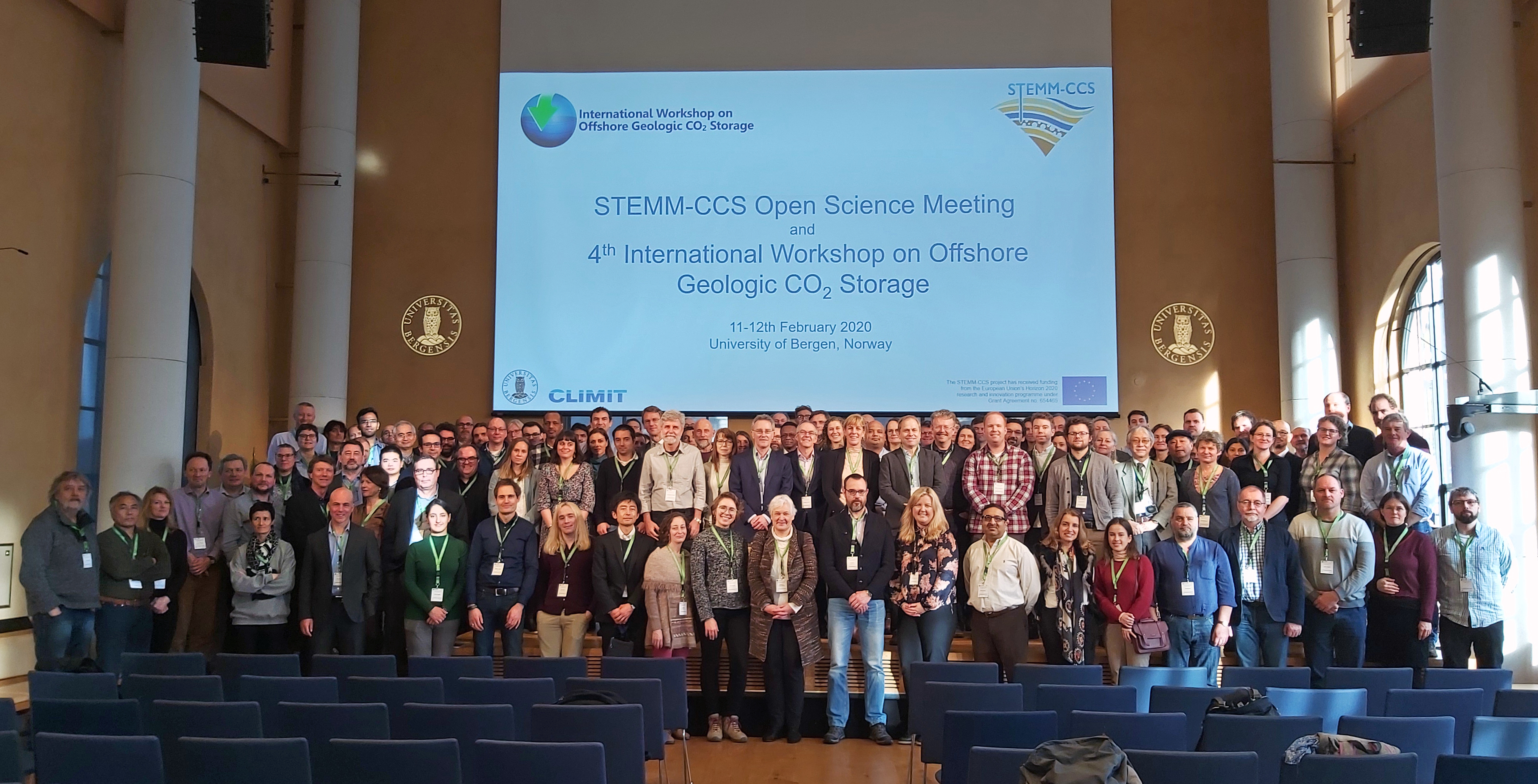
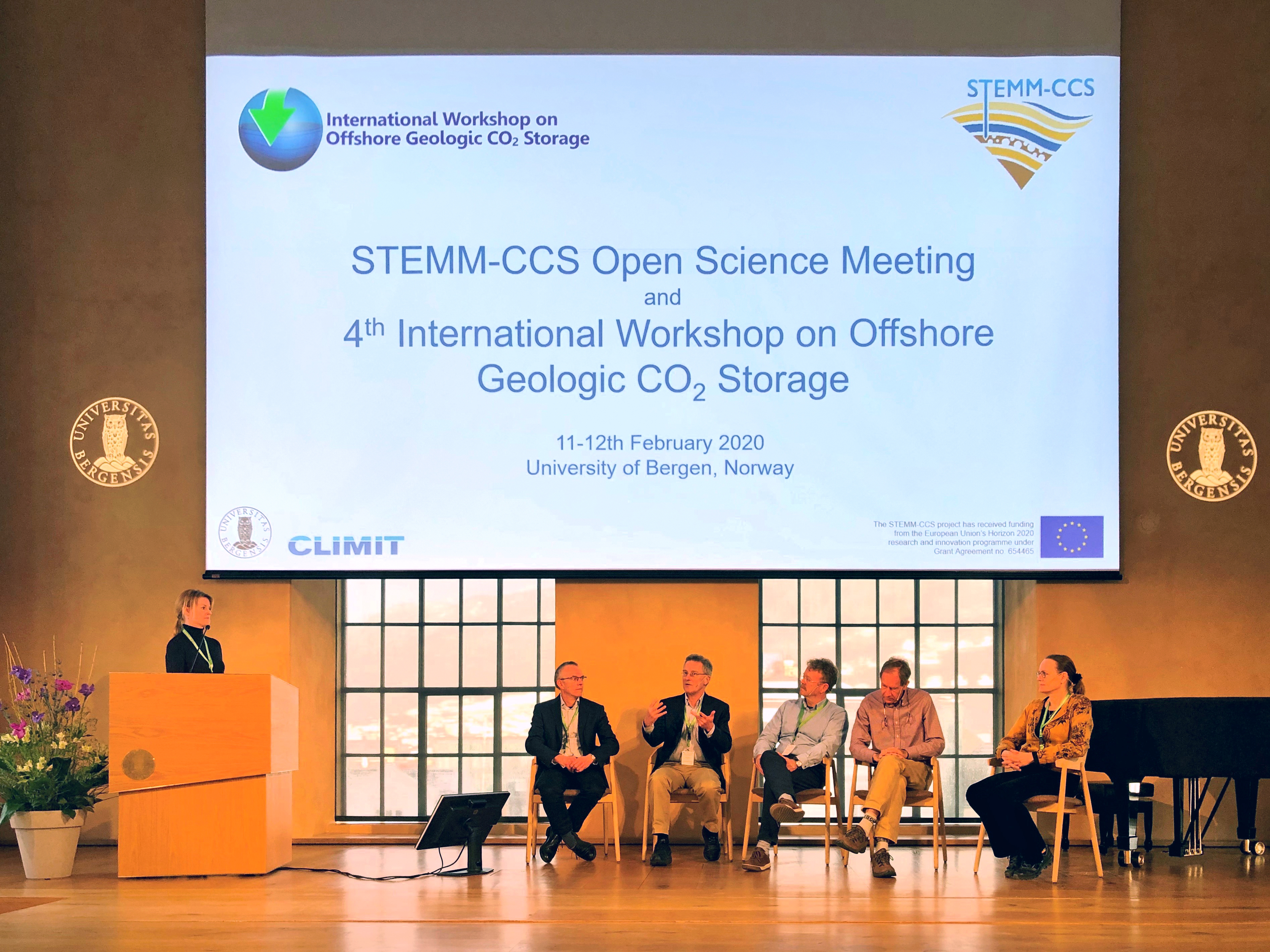
11-12 February 2020
Find a recap of the event on the IEAGHG blog.
STEMM-CCS Open Science Meeting
Find presentations on the STEMM-CCS website here.
Download the IEAGHG official meeting report of the workshop here.
PDF presentation slides
Download all presentations (7z)
Download all presentations (Zip)
Download individual presentations:
Tim Dixon, STEMM-CCS open science meeting and 4th International Workshop on Offshore Geologic CO2 Storage
Gunn Mangerud, CCUS activities in Bergen
Philip Ringrose, Use of existing infrastructure and knowledge: examples from Northern Lights project
Russ Gilbert, How to develop storage near & around existing infrastructure
Filip Neele, Stefan Belfroid, and Aris Twerda, CO2 storage in depleted gas fields
Sarah Gasda, Plugging and abandoning well strategies for storage development
M. LandrØ, Geophysical monitoring in the overburden, what can we detect?
Jen Roberts, Pressure, faults, and CO2 leakage
Tim Dixon, Update on the London Protocol CO2 Export Resolution
Martha Roggenkamp, Legal aspects of re-use of infrastructure for carbon dioxide storage (offshore)
Brian Hill, SECARB Offshore Gulf of Mexico available and leading practices
Philip Ringrose, Northern Lights: a European CO2 transport and storage network
Paula Negrais Seabra, Lula Oil Field CO2-EOR project update
Jiro Tanaka, Tomakomai CCS demonstration project
Darin Damiani, US storage resource assessments
Michael Godec, SSEB SECARB Offshore Gulf of Mexico Partnership
Gry MØl Mortensen, NORDICCS and BASRECCS: Nordic and Baltic collaborations
Filip Neele, Rotterdam CCUS project Porthos
Russ Gilbert, Acorn CCS: project update
Andrew Jupiter, Update on the development of a national carbon capture and storage programme in Trinidad and Tobago
Se Won Chang, Current status and future plan for CCS in Korea
Katherine Romanak for Chi-Wen Liao, Emerging CCS country needs and progress: Taiwan
Tip Meckel, GoMCarb update
Tim Dixon, Global sum-up
Third International Offshore Geologic CO2 Storage Workshop
May 3-4, 2018
Session 1 - Value Chains for Offshore: Chair – Lars Ingolf Eide
Emerging hydrogen value chains for Norway – Steinar Eikaas, Statoil
Emerging hydrogen value chains for Japan – KHI/Ryozo Tanaka, RITE
USA 45 Q and how it should accelerate potential CCUS projects – Brian Hill, SSEB
Welcome and Scene-setting: How to ‘Learn from our learnings’ – Tim Dixon, IEAGHG, and Katherine Romanak, BEG
Session 2 - Infrastructure: Chair – Paulo Negrais Seabra
New subsea systems for CO2 storage/EOR– making it cheaper and more efficient - Pål Nøkleby, Aker Solutions
Technical considerations in re-use of pipelines platforms – Steve Murphy, ACORN / Pale Blue Dot
New technology for handling legacy well integrity issues – Malin Torsæter, SINTEF
Session 3 - Monitoring Offshore CO2 Storage/EOR: Chair – Katherine Romanak
Handling microseismic background – Volker Oye, NORSAR, Norway
STEMM-CCS project updates on seafloor/environmental monitoring – Maribel I. García-Ibáñez, University of Bergen
UK AUV update on seafloor/environmental monitoring – Graham Brown, Sonardyne
Update on leakage detection – Keisuke Uchimoto, RITE
Update on shallow seismic (p-cable) at Tomakomai – Tip Meckel, BEG
Geophysical monitoring offshore – Philip Ringrose, Statoil
Session 4 - Offshore CO2 Storage Resource Assessment: Chair – Mike Carpenter
Storage resource assessment for offshore CO2-EOR in Norway – Eva Halland, Norway Petroleum Directorate
Update on US projects – Darin Damiani, US DOE
Approaches to evaluations, example from Gulf of Mexico – Tip Meckel, BEG
Updates on databases for CO2 Storage – informal discussion
South Africa depleted fields and platform re-use – Noel Kamrajh, SANEDI on behalf of PetroSA
Session 5 - Project Updates: Chair – Phillip Ringrose
Update on Norwegian project under development – Mike Carpenter, Gassnova
Pre-salt development and CO2 management – Paulo Negrais Seabra, formerly of Petrobras
Tomakomai – Jiro Tanaka, Japan CCS
Session 6 - Standards and Regulatory Frameworks: Chair – Tim Dixon
Tomakomai lessons learned in offshore CO2 storage regulations – Ryozo Tanaka, Rite
ISO storage standard (ISO 27914), and certification framework – Jorg Aarnes, DNV
Discussion on London Protocol application to Norway and EOR – Ingvild Ombudstvedt, GCCSI and Tim Dixon, IEAGHG, Chaired by Ryozo Tanaka, RITE
Session 7 - Interactive Session - Brainstorming towards an international collaborative project: facilitated by Katherine Romanak, Tim Dixon
Comments on public funding and new funding mechanisms – Hans Olav Ibrekk, Norwegian MFA, and Egil Meisingset, Norwegian MPE
Workshop Conclusions and Recommendations – Lars Ingolf Eide, Tim Dixon, Katherine Romanak, Tip Meckel
Second International Offshore Geologic CO2 Storage Workshop
June 18-20, 2017
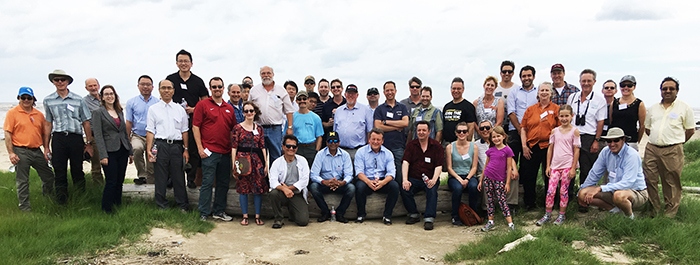
Click photo to view larger.
GCCC was delighted to host the Second International Offshore Geologic CO2 Storage Workshop June 18–20, 2017 at the Center of Innovation, Commercialization, and Entrepreneurship at Lamar University.
Welcome—Susan Hovorka
Towards an International Collaboration on Offshore Storage—Katherine Romanak, Susan Hovorka, Tip Meckel, Tim Dixon
Session 1. How to find storage offshore—mapping and screening for good sites: Chair, Susan Hovorka
- South Africa from zero to pilot project and offshore assessment—Noel Kamrajh, SANEDI
- Australia CarbonNet Stage 3—Nick Hoffman, CarbonNet
- CO2-storage screening for Norway—Niels Peter Christensen, Gassnova
- Deep Saline Formation storage screening in Petrel Australia—Owain Tucker, Shell
- EASiTool for storage capacity estimates—Seyyed Hosseini, BEG
Session 2. Technical Deep-dive Monitoring—How much is needed, how much do regulators need, limits of Monitoring: Chair, Tim Dixon
- Goldeneye monitoring for EU permit and cost reductions—Owain Tucker, Shell
- ROAD monitoring for EU permit—Vincent Vandeweijer, TNO
- Environmental regulations of subsea geological storage of CO2 in Norway—Lars Ingolf Eide on behalf of Norwegian Environmental Directorate
- Update on Developing Best Practices for offshore storage in the US—Melissa Batum, BOEM
Session 3. Technical Deep-dive Environmental and overburden monitoring: Chair, Katherine Romanak
- Leak detection —Keisuke Uchimoto, RITE
- GoM shallow overburden work—Tip Meckel, BEG
- AUVs for environmental monitoring—Kim Swords, Sonardyne
Session 4. Changing the Game for CO2—EOR Offshore: Chair, Paulo Negrais Seabra
- CSLF CO2-EOR Task Force update—Lars Ingolf Eide, RCN
- North Sea technical and economic potential—Stuart Haszeldine, SCCCSl
- Establishing CO-Utilization, Storage and Pipeline Systems for Oil Fields in Shallow and Deep Waters of the Gulf of Mexico—Vello Kuuskraa, ARI
- US EOR learnings from onshore for offshore—Sue Hovorka, BEG
Session 5. Infrastructure developments: Chair, Tip Meckel
- CO2 Transport and Storage infrastructure development, challenges and possible way forward—Thomas Berly, IEA
- Smart Technology for CO2 handling subsea—Lars Ingolf Eide on behalf of Aker Solutions
- Re-use of hydrocarbon wells—Gert-Jan Heerens, TNO
Session 6. Panel discussion on US developments in offshore storage assessment: Chair, Lars Ingolf Eide
- Mid-Atlantic Assessment—Neeraj Gupta, Battelle
- Southeast Atlantic Offshore—Jack Pashin (Oklahoma State University) & Jim Knapp (University of South Carolina
- Near-offshore storage on the inner shelf of the Gulf of Mexico—Tip Meckel, BEG
- Deep ocean basalt formations mineral carbonation—Dave Goldberg, Columbia University
Posters
- Use of high-resolution 3D marine seismic for characterization and monitoring of offshore CCS sites—Tip Meckel, Gulf Coast Carbon Center, The University of Texas Bureau of Economic Geology
- CO2 Storage Potential of the MAFLA Shelf, Eastern Gulf of Mexico—Jack C. Pashin, Boone Pickens School of Geology, Oklahoma State University
- Public and stakeholder understandings of offshore CO2 storage and implications for monitoring: The case of the Tomakomai CCS Demonstration Project—Leslie Mabon, School of Applied Social Studies, Robert Gordon University, Scotland
- Long Term Prediction of CO2 flow Behavior by Field Scale Flow Simulation Model—Yutaka Tanaka, Daiji Tanase, Takayasu Honda, Japan CCS Co., Ltd.
- Carbon Dioxide (CO2) Project in the Brillante Field, Sustainable EOR Project—Heron Gachuz Muro, Pemex Exploration & Production
- Tomakomai CCS Demonstration Project—Environmental Impact Assessment and Leakage detection—Jun Kita, Applied Biology Group, Marine Ecology Research Institute
- CO2 storage options and CCS development in The Netherlands—Filip Neele, TNO
- Brazil Country Update—Paulo Negrais, Seabra Independent Consultant, formerly Petrobras
- Use of natural and artificial tracers to detect and quantify CO2 leakages at the seafloor from marine CO2 storage sites—Anita Flohr, National Oceanography Centre, University of Southampton, UK
- Carbon Sequestration in the Southeastern United States: Past, Present, and Future —Camelia C. Knapp, School of the Earth, Ocean, and Environment/Earth Sciences and Resources Institute, University of South Carolina
- EASiTool: An Enhanced Analytical Simulation Tool for Storage Capacity Estimation—Seyyed Hosseini, Gulf Coast Carbon Center, The University of Texas Bureau of Economic Geology
- STEMM-CCS: Strategies for Environmental Monitoring of Marine Carbon Capture and Storage—STEMM-CSS Project, National Oceanography Centre, Southampton, UK
- The CarbonNet Project—Nick Hoffman (CarbonNet), Nick Hardman-Mountford (SIRO Oceans and Atmosphere Flagship, Hobart, Australia), Charles Jenkins (CSIRO, Black Mountain, Canberra, Australia), Peter J Rayner, Gary Gibson, and Mike Sandiford ( (School of Earth Sciences, University of Melbourne, Melbourne Australia)
- IEAGHG—Tim Dixon, IEAGHG
- Storing CO2 in the Offshore since 1996—Gassnova
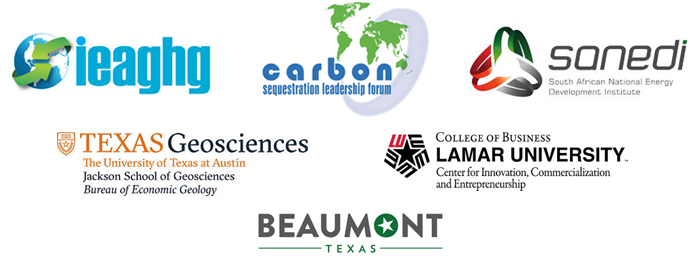
First International Offshore Geologic CO2 Storage Workshop
April 19-21, 2016
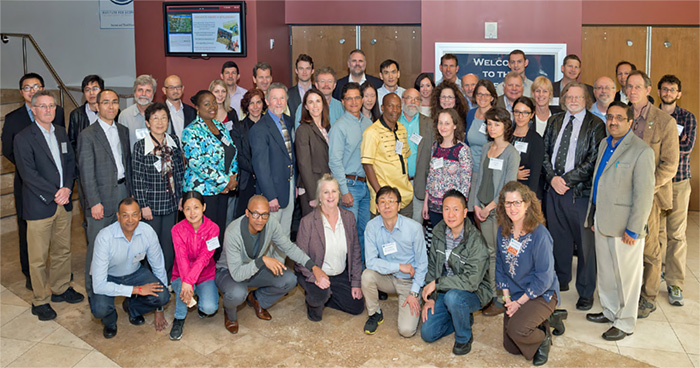
GCCC was delighted to host the first International Offshore Geologic CO2 Storage Workshop April 19–21, 2016. Please see below for agenda and technical presentations.
Session 1—Welcome and Goals
- Welcome—Scott Tinker
- Goals and Expectations—Tim Dixon
- Carbon Sequestration Leadership Forum—Mark Ackiewicz
Session 2—Current State of Knowledge
- Assessing Offshore Storage on Continental Shelves—Tip Meckel
- Assessing CCS in Norway—Philip Ringrose
- How to develop a pilot injection project offshore—Vincent Vandeweijer
- How to reach an offshore injection phase—Ryozo Tanaka
- How to do environmental monitoring offshore —Jun Kita
- How to do EOR offshore—Paulo Seabra
- Subsea well stream processing/ship transport options—Paal Helge Nøkleby and Filip Neele
- How to meet international regulations covering offshore CCS—Tim Dixon
Session 3—Country Status
- Country Status and Needs Assessment Reports and Discussions: Summary—Susan Hovorka
- South Africa—Tony Surridge
- China – Zhou Di
- USA—Traci Rodosta
- Nigeria—Felicia Mogo
- Ghana—Joseph Essandoh-Yeddu
- Korea—Sang Hoon Lee
- Mexico—Jazmin Mota
- Australia—Charles Jenkins
- SE Asia and CCOP initiative—Tim Dixon on behalf of Simplicio Caluyong
- Baltic BASREC project —Tim Dixon on behalf of Nicklas Nordback
Session 4—Guided Activity
- Summary of needs including business models —Sue Hovorka and Philip Ringrose
Session 5—Recommendations and Next Steps
- CTCN Presentation and Recognition —Katherine Romanak
- CSLF Joint Task Force on Offshore CO2-EOR—Lars Ingolf Eide
Session 6—Posters
- Mid-Atlantic U.S. Offshore Carbon Storage Resource Assessment —Isis Fukai
- Southeast Offshore Storage Resource Assessment: Mid-Atlantic—E. Gilliland
- CarbonNet-Storage: ~ T2 Intraformational Seals CCUS Poster A FINAL v2.1 approved IF 20150402
- CarbonNet-Storage: ~ T2 Intraformational Seals CCUS Poster B FINAL v2.1 approved IF 20150402
- CarbonNet-Storage: Publications 2015, CarbonNet Southampton IEAGHG Network Poster A v1.1
- CarbonNet-Storage: Publications 2015, CarbonNet Southampton IEAGHG Network Poster B v1.1
- EGOM SOSRA poster-1
- Preliminary stratigraphy and depositional framework of Miocene in offshore Texas and Louisiana for CO2-EOR resource assessment—Iulia Olariu
- Regional Assessment of CO2-Solubility Trapping Potential: Case Study of the Coastal and Offshore Texas Miocene Interval—Changbing Yang

Last Updated: May 20, 2025

